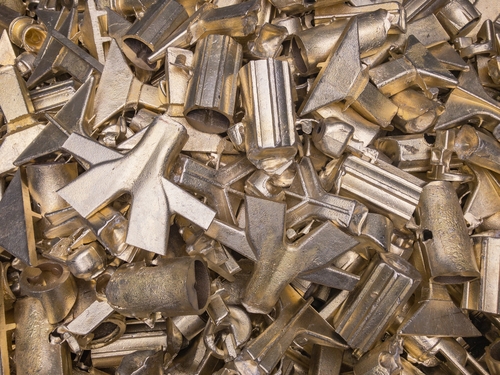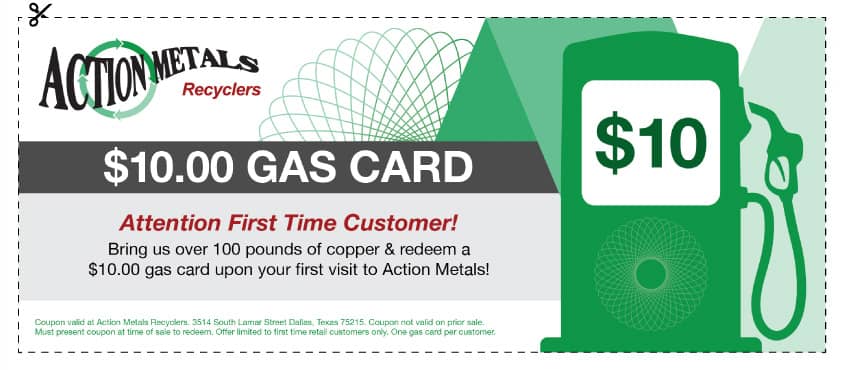Brass is a versatile metal alloy composed primarily of copper and zinc. It is commonly used in plumbing fixtures, musical instruments, ammunition casings, and decorations. With its bright gold color and durability, brass has become popular in many industries.
However, brass production requires mining for copper and zinc and energy-intensive smelting processes. While many environmentalists worry about the community impact of creating new brass products, the good news is that brass is 100% recyclable.
We can melt brass down from our Dallas scrap metal recycling facility and reform it repeatedly without losing performance or quality.
Recycling brass provides numerous environmental and economic benefits. Let’s take a look at some of the best reasons why you should recycle your brass products today!
Conserving Natural Resources
Mining copper and zinc is environmentally destructive, disturbing landscapes and producing hazardous mine waste. Recycling reduces the need for virgin mining, conserving these finite natural resources.
Recycling also reduces the amount of energy needed to manufacture brass. Extracting and processing virgin materials consumes far more energy than remelting scrap metal.
Since 1994, Action Metals Recyclers has helped community members and businesses in Dallas, Texas, conserve natural resources, reduce energy waste, and make recycling scrap metal a lucrative and beneficial move for the environment.
Call us today at (214) 421-9981, to learn more about how we can help you organize your next brass drop-off.
Recycling Brass Reduces Waste
Brass products that are discarded rather than recycled become waste in landfills. Landfill space is limited, and brass can take hundreds of years to fully decompose.
Recycling keeps brass out of landfills while providing the raw material for new brass products. This reduces waste generation and the need for new disposal capacity.
Lowering Greenhouse Gas Emissions
Mining, smelting, and manufacturing brass from virgin materials generates substantial greenhouse gas emissions.
As environmental enthusiasts, our recycling experts hold firm in the fact that recycling copper and zinc (the main components of brass) reduces related carbon dioxide emissions. Recycling is a simple way to lower the brass industry’s carbon footprint.
Recycling Brass Contributes to a Circular Economy in Dallas, TX
Recycling enables a circular economy, where materials are continually cycled through use, collection, and remanufacturing. This brings large environmental gains while reducing reliance on scarce natural resources.
Generate Revenue, Save the Environment
In addition to its environmental benefits, brass recycling can also create financial returns. Our Dallas scrap yard purchases used brass that we can recycle and pay forward to metal refiners and manufacturers.
This generates supplementary income for households and revenue for businesses that collect large volumes of brass. Recycling is an opportunity to recover value from discarded products that are just eating up space on your property.
Common Sources of Recyclable Brass
Many everyday items contain recyclable brass components or fittings. Being aware of these products enables more brass to be captured and recycled. Here are some common sources of recyclable brass:
Plumbing Fixtures
Brass fittings and valves are extensively used in home and industrial plumbing systems. This includes pipe connectors, compression fittings, and faucets. Bathroom and kitchen faucets account for a significant amount of recyclable household brass.
Musical Instruments
The warm sound of brass instruments depends on, well, brass. Brass used in instruments includes tubing, valves, brackets, and decorative trim. Recyclable brass is found in trumpets, trombones, saxophones, French horns, and tubas. Even small instrument parts contain reusable brass.
Ammunition Shells
The malleability and corrosion resistance of brass has made it the primary metal for ammunition shells. This includes bullet casings from pistols, rifles, shotguns, and automatic weapons. Fired shells, which can number in the hundreds at shooting ranges, are ideal candidates for brass recycling.
Door Hardware
Knockers, pulls, kick plates, hinges, and locking mechanisms frequently contain brass components. This hardware is often solid brass, brass plated, or contains brass fasteners. Door hardware of all types, whether being replaced or from demolition sites, can be set aside for brass recycling.
Radiators and Electronics
Salvaged antique radiators, heat exchangers, and piping contain significant brass content. E-waste like televisions, batteries, wiring, and computers also have recyclable copper and brass components. While not the largest sources, these niche items expand the pool of recyclable brass.
Recycle Brass with Action Metals Recyclers
To start brass recycling, contact Action Metals Recyclers. As a fully licensed recycler, Action Metals offers free drop-off and pick-up for brass and other valuable scrap metals.
We offer the best prices in Dallas for scrap metal and are ready to help you benefit from your scraps today.
Contact us to learn about our metal recycling services and schedule your first brass drop-off.







